Abstract
BACKGROUND. Women with phenylketonuria (PKU) not treated prior to conception can have a pregnancy that results in serious fetal damage. In this report, factors associated with preventing unplanned (and hence late treated) pregnancies are described. METHODS. Subjects included 60 phenylketonuric women and two comparison groups composed of female acquaintances and diabetic women. All were interviewed and administered tests of intelligence, general well-being, knowledge, and personality. RESULTS. Thirty-five percent of the sexually active women with PKU used contraception only sporadically. The variables that best predicted reported frequency of birth control use were the extent to which women felt social support to use contraception (r = .64) along with positive attitudes about birth control (r = .66) and knowledge of family planning (r = .43). For the comparison groups, a different pattern of variables predicted contraceptive use, with locus of control figuring most prominently for the diabetics (r = .39) and social support for birth control being most important for the acquaintances (r = .46). CONCLUSIONS. As more girls with PKU enter childbearing ages, there will be an increased need for specific programs that address psychosocial factors in maternal PKU.
Full text
PDF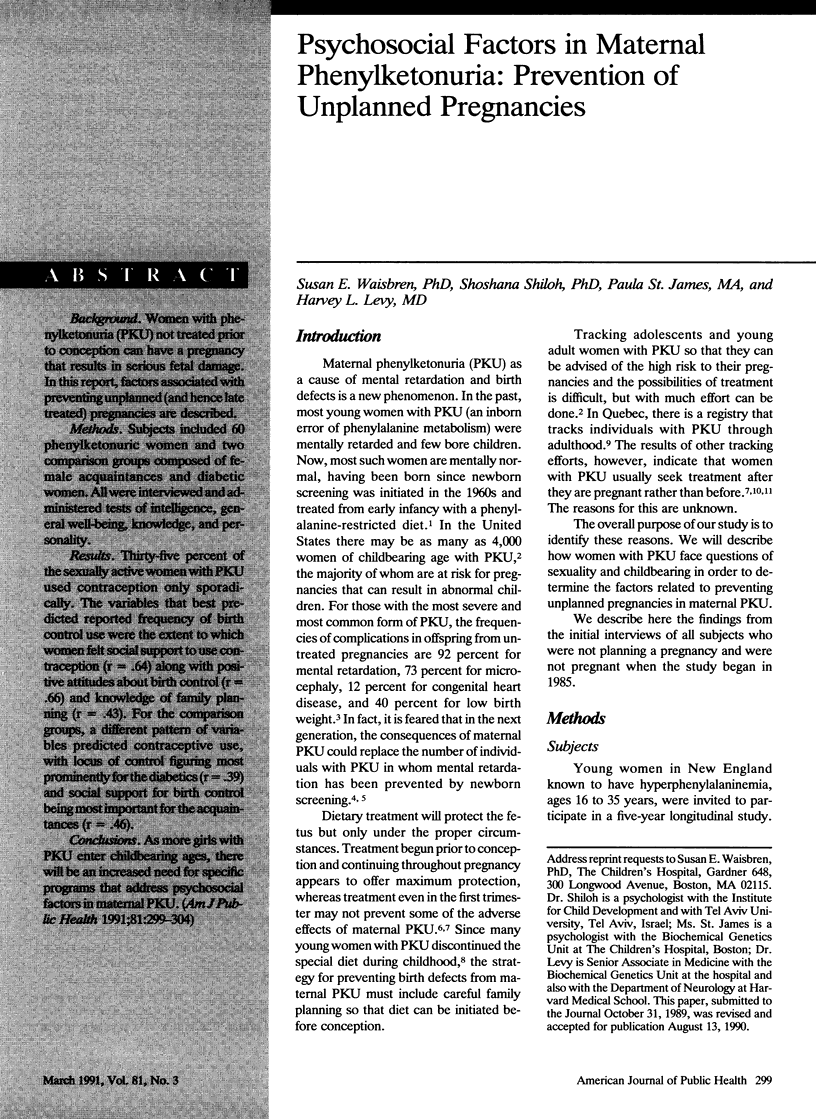
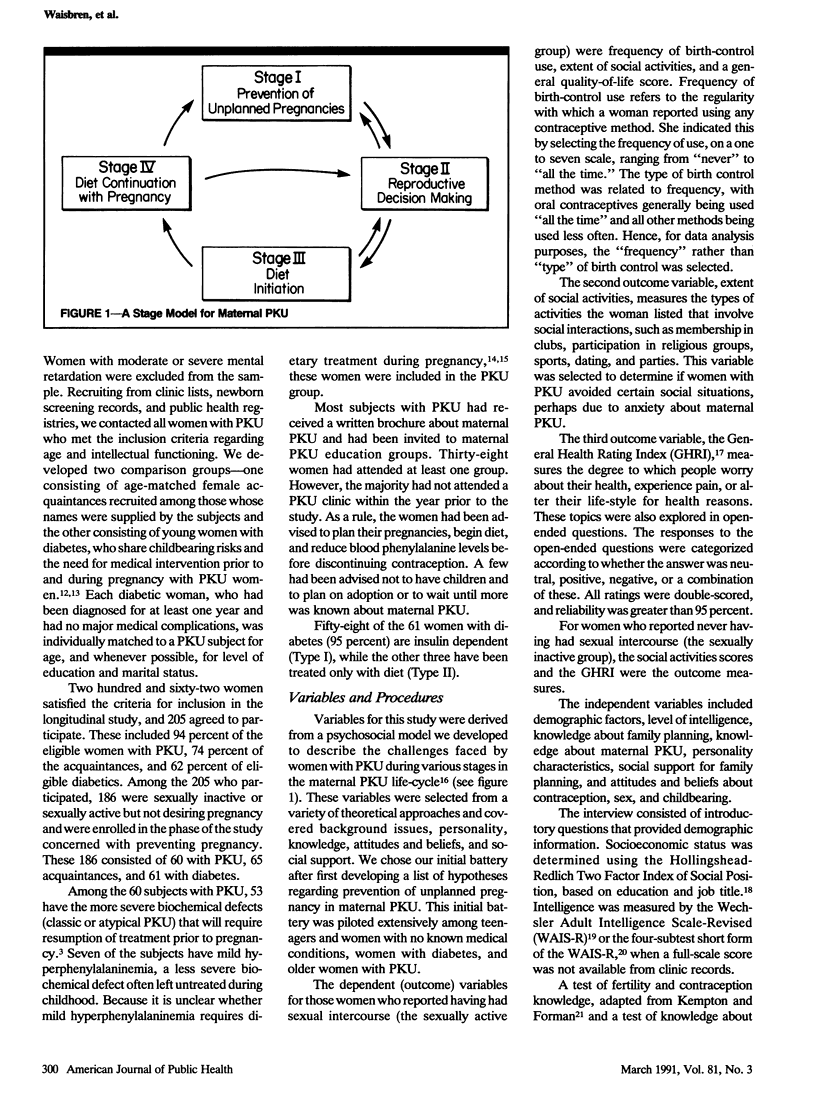
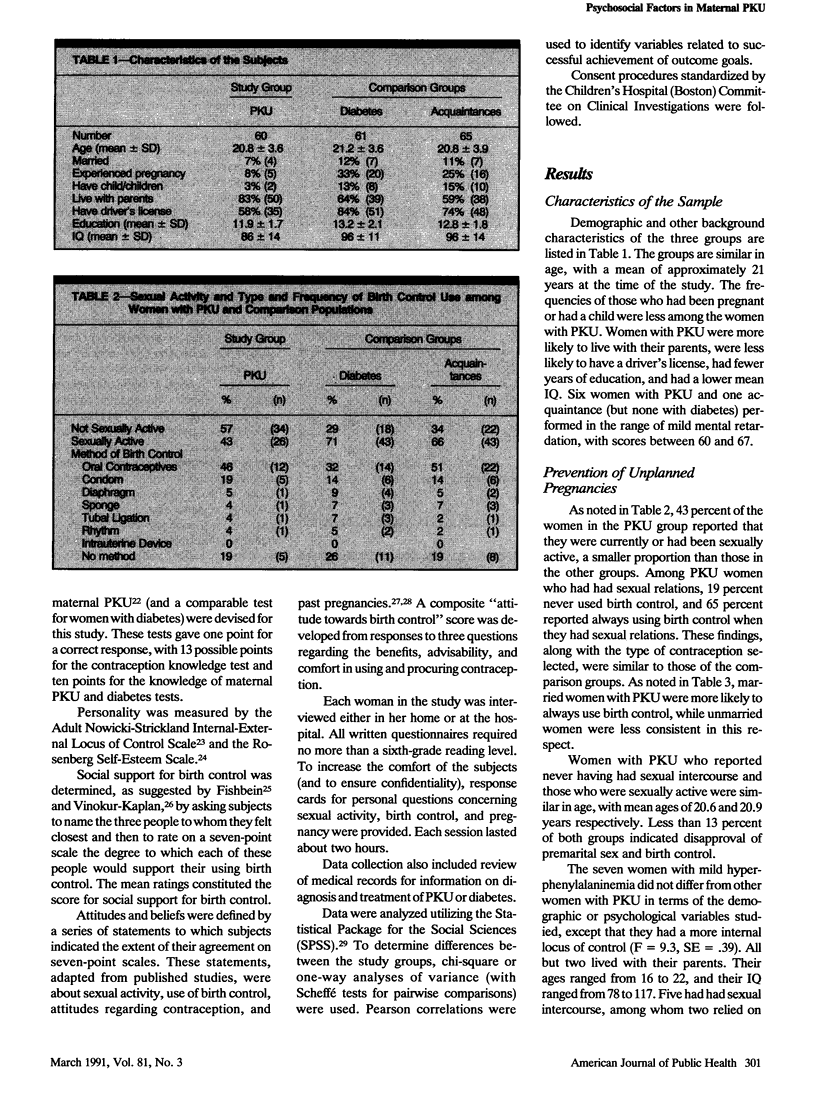
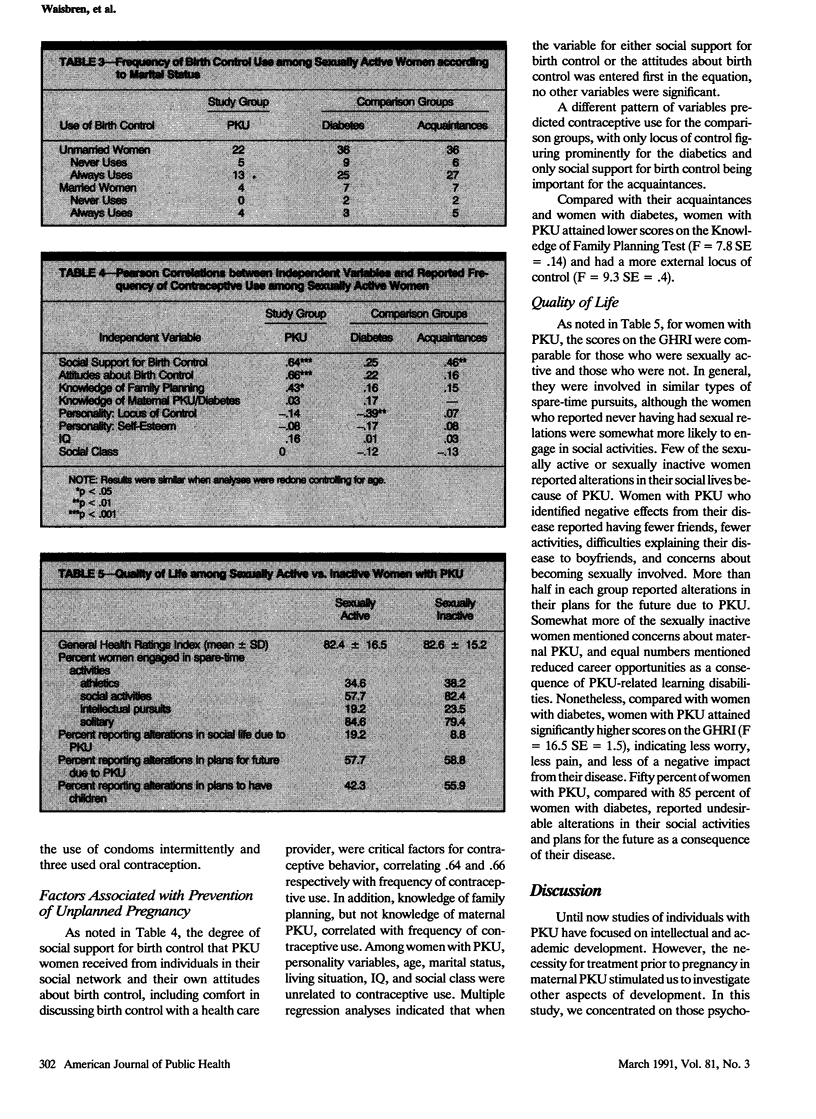
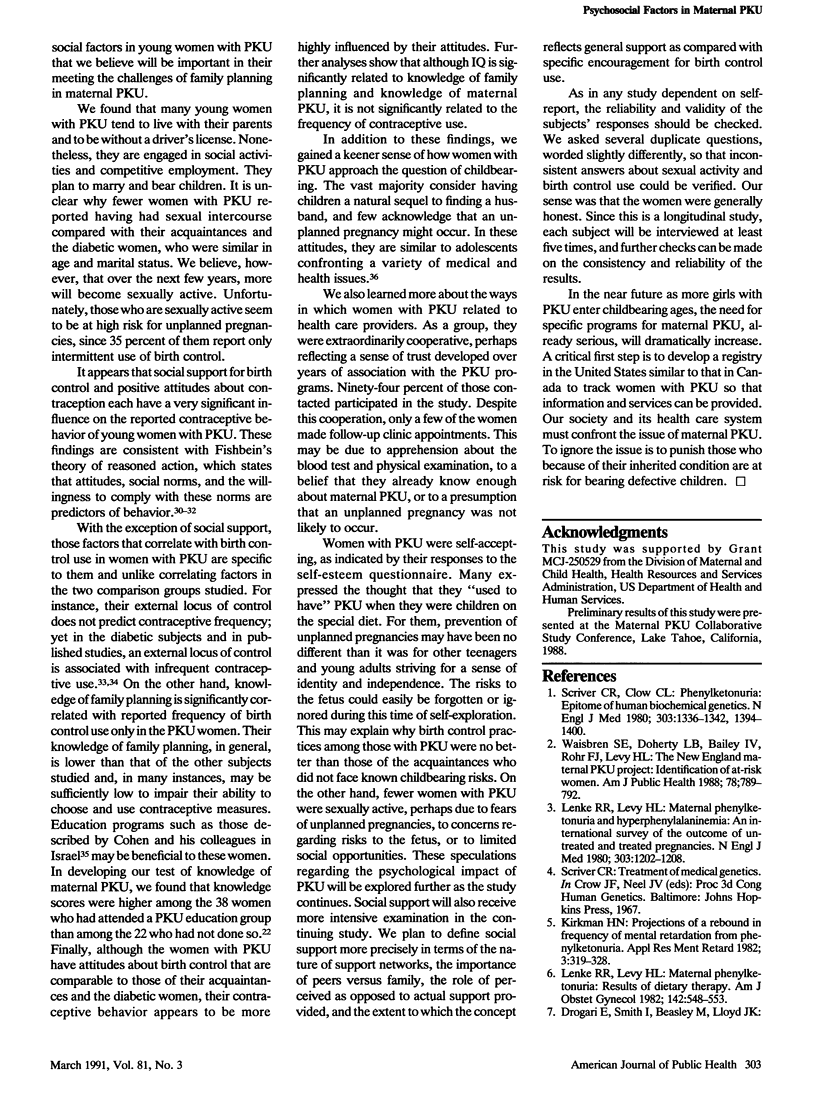
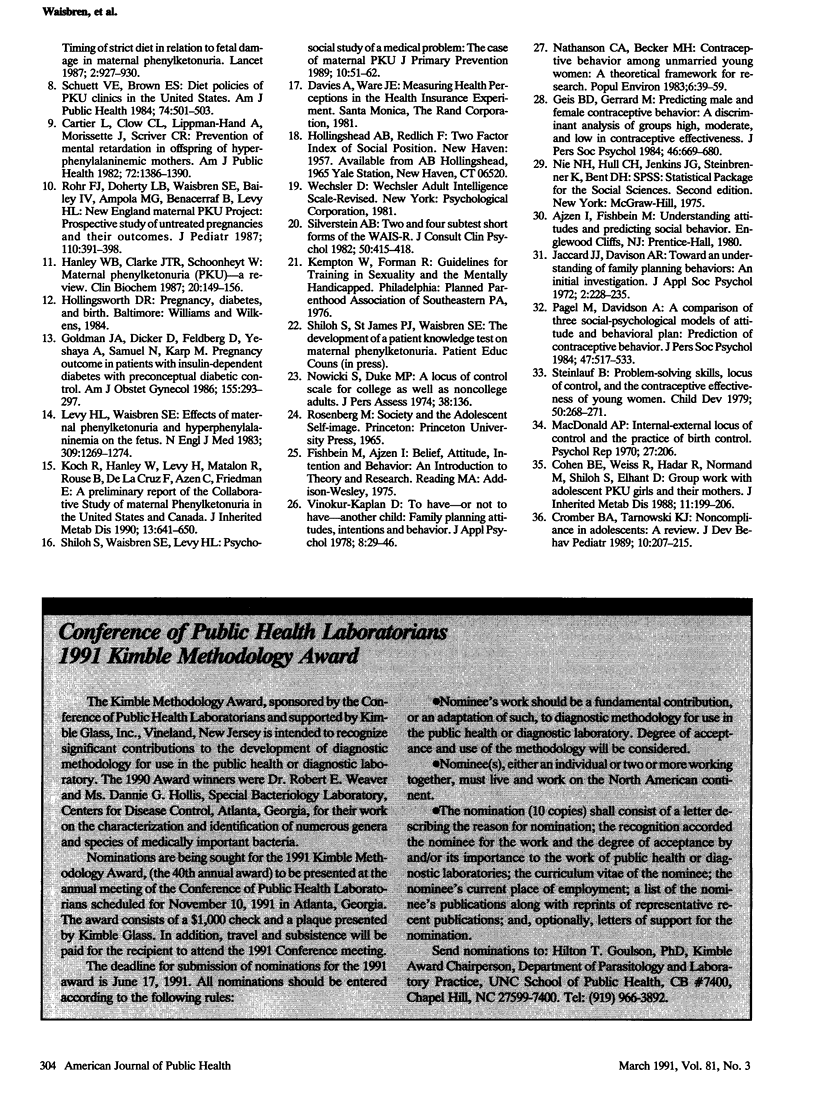
Selected References
These references are in PubMed. This may not be the complete list of references from this article.
- Cartier L., Clow C. L., Lippman-Hand A., Morissette J., Scriver C. R. Prevention of mental retardation in offspring of hyperphenylalaninemic mothers. Am J Public Health. 1982 Dec;72(12):1386–1390. doi: 10.2105/ajph.72.12.1386. [DOI] [PMC free article] [PubMed] [Google Scholar]
- Cohen B. E., Weiss R., Hadar R., Normand M., Shiloh S., Elhanati D. Group work with adolescent PKU girls and their mothers. J Inherit Metab Dis. 1988;11(2):199–206. doi: 10.1007/BF01799875. [DOI] [PubMed] [Google Scholar]
- Cromer B. A., Tarnowski K. J. Noncompliance in adolescents: a review. J Dev Behav Pediatr. 1989 Aug;10(4):207–215. [PubMed] [Google Scholar]
- Geis B. D., Gerrard M. Predicting male and female contraceptive behavior: a discriminant analysis of groups high, moderate, and low in contraceptive effectiveness. J Pers Soc Psychol. 1984 Mar;46(3):669–680. doi: 10.1037//0022-3514.46.3.669. [DOI] [PubMed] [Google Scholar]
- Goldman J. A., Dicker D., Feldberg D., Yeshaya A., Samuel N., Karp M. Pregnancy outcome in patients with insulin-dependent diabetes mellitus with preconceptional diabetic control: a comparative study. Am J Obstet Gynecol. 1986 Aug;155(2):293–297. doi: 10.1016/0002-9378(86)90812-4. [DOI] [PubMed] [Google Scholar]
- Hanley W. B., Clarke J. T., Schoonheyt W. Maternal phenylketonuria (PKU)--a review. Clin Biochem. 1987 Jun;20(3):149–156. doi: 10.1016/s0009-9120(87)80112-1. [DOI] [PubMed] [Google Scholar]
- Kirkman H. N. Projections of a rebound in frequency of mental retardation from phenylketonuria. Appl Res Ment Retard. 1982;3(3):319–328. doi: 10.1016/0270-3092(82)90023-6. [DOI] [PubMed] [Google Scholar]
- Koch R., Hanley W., Levy H., Matalon R., Rouse B., Dela Cruz F., Azen C., Gross Friedman E. A preliminary report of the collaborative study of maternal phenylketonuria in the United States and Canada. J Inherit Metab Dis. 1990;13(4):641–650. doi: 10.1007/BF01799519. [DOI] [PubMed] [Google Scholar]
- Lenke R. R., Levy H. L. Maternal phenylketonuria and hyperphenylalaninemia. An international survey of the outcome of untreated and treated pregnancies. N Engl J Med. 1980 Nov 20;303(21):1202–1208. doi: 10.1056/NEJM198011203032104. [DOI] [PubMed] [Google Scholar]
- Lenke R. R., Levy H. L. Maternal phenylketonuria--results of dietary therapy. Am J Obstet Gynecol. 1982 Mar 1;142(5):548–553. doi: 10.1016/0002-9378(82)90759-1. [DOI] [PubMed] [Google Scholar]
- Levy H. L., Waisbren S. E. Effects of untreated maternal phenylketonuria and hyperphenylalaninemia on the fetus. N Engl J Med. 1983 Nov 24;309(21):1269–1274. doi: 10.1056/NEJM198311243092101. [DOI] [PubMed] [Google Scholar]
- MacDonald A. P., Jr Internal-external locus of control and the practice of birth control. Psychol Rep. 1970 Aug;27(1):206–206. doi: 10.2466/pr0.1970.27.2.206. [DOI] [PubMed] [Google Scholar]
- Pagel M. D., Davidson A. R. A comparison of three social-psychological models of attitude and behavioral plan: prediction of contraceptive behavior. J Pers Soc Psychol. 1984 Sep;47(3):517–533. doi: 10.1037//0022-3514.47.3.517. [DOI] [PubMed] [Google Scholar]
- Rohr F. J., Doherty L. B., Waisbren S. E., Bailey I. V., Ampola M. G., Benacerraf B., Levy H. L. New England Maternal PKU Project: prospective study of untreated and treated pregnancies and their outcomes. J Pediatr. 1987 Mar;110(3):391–398. doi: 10.1016/s0022-3476(87)80500-0. [DOI] [PubMed] [Google Scholar]
- Schuett V. E., Brown E. S. Diet policies of PKU clinics in the United States. Am J Public Health. 1984 May;74(5):501–503. doi: 10.2105/ajph.74.5.501. [DOI] [PMC free article] [PubMed] [Google Scholar]
- Scriver C. R., Clow C. L. Phenylketonuria: epitome of human biochemical genetics (second of two parts). N Engl J Med. 1980 Dec 11;303(24):1394–1400. doi: 10.1056/NEJM198012113032404. [DOI] [PubMed] [Google Scholar]
- Steinlauf B. Problem-solving skills, locus of control, and the contraceptive effectiveness of young women. Child Dev. 1979 Mar;50(1):268–271. [PubMed] [Google Scholar]
- Waisbren S. E., Doherty L. B., Bailey I. V., Rohr F. J., Levy H. L. The New England Maternal PKU Project: identification of at-risk women. Am J Public Health. 1988 Jul;78(7):789–792. doi: 10.2105/ajph.78.7.789. [DOI] [PMC free article] [PubMed] [Google Scholar]


